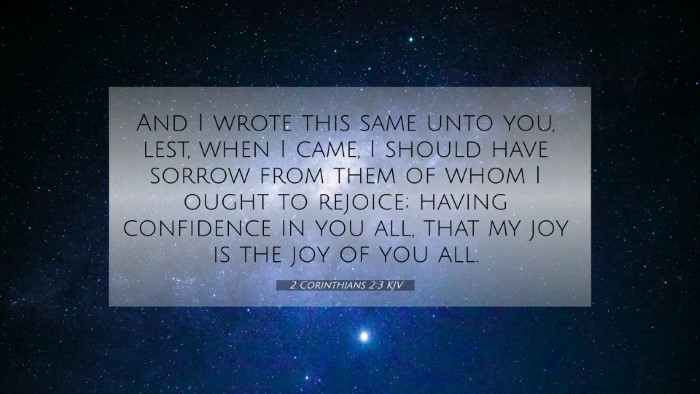Understanding 2 Corinthians 2:3
Bible Verse: 2 Corinthians 2:3
This verse reads, "And I wrote this very thing to you, lest, when I came, I should have sorrow over those from whom I ought to have joy, having confidence in you all that my joy is the joy of you all."
Contextual Background
In this passage, the Apostle Paul expresses his thoughts regarding his relationship with the Corinthian church. It reflects his pastoral concern and emotional investment in their spiritual well-being.
Verse Analysis
- Pastoral Responsibility: Paul reveals a deep sense of responsibility for the spiritual state of the church. His desire for joy rather than sorrow illustrates the emotional weight that leaders carry.
- Expectations of Joy: Paul connects his joy to theirs, underscoring the communal nature of joy within the body of Christ, where the success of one member brings joy to all.
- Preemptive Communication: Paul emphasizes the importance of clear communication, suggesting that addressing issues beforehand can mitigate potential grief.
Commentary Insights
Matthew Henry: Henry elaborates on the significance of emotional ties in church leadership. He notes that a pastor's joy should stem from the growth and obedience of their congregation.
Albert Barnes: Barnes comments on the nature of interpersonal relationships within the church, highlighting that members should act to promote mutual edification.
Adam Clarke: Clarke reflects on the importance of understanding and trust in Paul's relationship with the Corinthians, suggesting that proper communication can prevent misunderstandings.
Cross-Referencing Biblical Texts
This verse is interconnected with several other scriptures that enhance its understanding:
- 2 Corinthians 1:24: "Not that we have dominion over your faith, but are fellow workers for your joy; for by faith you stand." This reflects a similar theme of shared joy in faith.
- Philippians 1:25: "And being confident of this, I know that I shall remain and continue with you all for your progress and joy of faith." Paul emphasizes the joy resulting from mutual spiritual growth.
- Romans 12:15: "Rejoice with those who rejoice, and weep with those who weep." This verse encapsulates the joy-sorrow dynamic Paul emphasizes.
- Galatians 5:22: "But the fruit of the Spirit is love, joy, peace...". Paul indicates that joy is a vital part of the Christian experience.
- 1 Thessalonians 2:19-20: "For what is our hope, or joy, or crown of rejoicing? Is it not even you in the presence of our Lord Jesus Christ at His coming?" This connects the source of a leader's joy directly to the faith of those they serve.
- 2 Timothy 1:4: "Greatly desiring to see you, being mindful of your tears, that I may be filled with joy." This reflects Paul's emotional ties and expectations of joy in ministry.
- John 15:11: "These things have I spoken to you, that My joy may remain in you, and that your joy may be full." Jesus speaks about joy being completed in believers as they follow Him.
Thematic Connections
Many themes emerge from this verse and its context, highlighting the following:
- Emotional investment in relationships.
- Spiritual growth's impact on community dynamics.
- The necessity of proactive communication in leadership.
Practical Applications
Understanding this verse encourages believers to:
- Value communal joy: Recognize that individual and collective joy is intertwined within the church.
- Prioritize communication: Address potential issues early to preserve relationships and joy.
- Support leaders: Acknowledge the emotional burdens leaders carry and strive to bring them joy through faithfulness and growth.
Conclusion
2 Corinthians 2:3 conveys profound insights into the relational dynamics within the church and the role of a pastor. Paul’s deep care for the Corinthians exemplifies how leaders are emotionally tied to their congregations. By engaging with this verse and its connections, believers can cultivate a healthy, joyful community. These themes resonate widely in the New Testament, encouraging mutual support and joy among believers.













